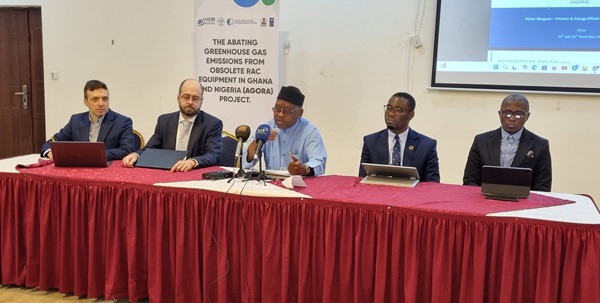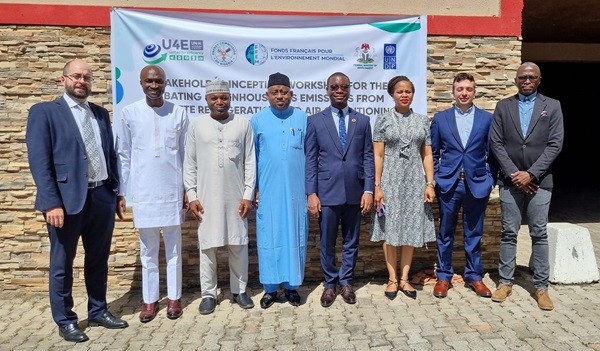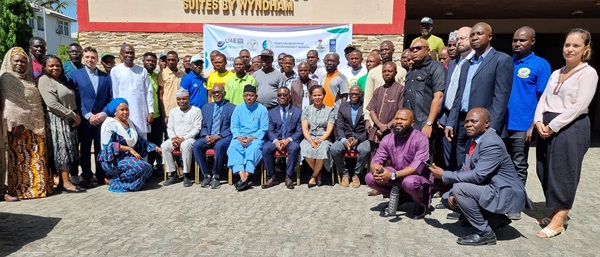
The Nigerian government has launched the Abating Greenhouse Gas Emissions from Obsolete Refrigeration and Air Conditioning (AGORA) Equipment Project, aiming to establish energy-efficient and climate-friendly cooling and refrigeration technologies as the standard.
At a stakeholders’ workshop organised by the Federal Ministry of Environment through the National Ozone Office, in collaboration with the Energy Commission of Nigeria, the United Nations Environment Programme (UNEP), United for Efficiency (U4E) and the United Nations Development Programme (UNDP), the initiative, supported by the French Global Environment Facility (GEF), was highlighted as a key tool for addressing climate change.
In his welcome address, the National Ozone Officer at the National Ozone Office, Engr. Idris Abdullahi, explained that the AGORA Project is designed to promote energy-efficient and low Global Warming Potential (GWP) technologies while strengthening policies to reduce greenhouse gas (GHG) emissions.
“The AGORA project presents an opportunity to advance the transition to energy-efficient and low-GWP technologies in the refrigeration and air conditioning (RAC) sector by establishing policies and partnerships that reduce GHG emissions at the equipment’s end-of-life stage,” Abdullahi stated.
He further noted that the project, which is in its initial stages and will run for three years, aims to phase out obsolete RAC equipment and transform the RAC market through ambitious replacement programmes for outdated equipment. This initiative will also support south-south cooperation between Nigeria and Ghana, where the project is being implemented.
Abdullahi recalled Nigeria’s longstanding commitment to the Montreal Protocol on Substances that Deplete the Ozone Layer, including the Kigali Amendment on phasing down Hydrofluorocarbons (HFCs). Over three decades, Nigeria has implemented the Protocol’s Ozone Depleting Substances Phase-Out Programme across various sectors, such as refrigeration, air conditioning and foam production.
In his remarks, the acting director of the energy transition unit, Energy Commission of Nigeria (ECN), Dr. Shehu Mustapha, emphasised the AGORA Project’s role in accelerating the transition to energy-efficient and climate-friendly cooling solutions in Nigeria and Ghana.
“This project aims to shape the future of air conditioning and refrigeration standards in Nigeria by driving advancements in energy efficiency, reducing greenhouse gas emissions, and supporting sustainable economic growth,” Mustapha said.

Global Partnerships and Strategic Goals
Project manager from UNEP-U4E, Mr. Mzwandile Thwala highlighted AGORA’s contributions to integrating energy-efficient and sustainable cooling solutions into Nigeria’s climate goals.
“The project is a critical tool for addressing climate challenges, driving economic growth and enhancing community well-being. It promotes the use of low-GWP refrigerants and energy-efficient air conditioners in residential and commercial sectors, reducing energy demand and emissions,” Thwala explained.
Thwala outlined UNEP-U4E’s integrated policy approach, which focuses on five key components to facilitate the transition to sustainable cooling solutions:
1. Standards and Regulations: Setting clear energy efficiency requirements for market products.
2. Supporting Policies: Educating consumers about energy performance to enable informed decisions.
3. Finance Mechanisms: Offsetting the higher purchase costs of energy-efficient products to improve accessibility.
4. Monitoring and Enforcement: Ensuring compliance with standards and verifying product quality.
5. Environmental Management: Addressing the proper disposal and end-of-life management of RAC equipment and refrigerants.
“The AGORA Project embodies a collective commitment to replacing obsolete RAC equipment with climate-friendly alternatives, strengthening financing mechanisms, and setting new benchmarks for circular economy practices in the RAC sector,” Thwala added.
He reaffirmed UNEP-U4E’s commitment to supporting Nigeria’s transition to energy-efficient technologies and reducing greenhouse gas emissions in the RAC sector.

Regional and Local Collaboration
Regional policy and technical specialist for Africa at UNDP, Mr. Joel Darkwah described AGORA as a vital project for promoting sustainable cooling solutions and advancing a circular economy in Nigeria.
“Nigeria has long been a leading actor in implementing the Montreal Protocol and has been globally recognised for its proactive role,” Darkwah stated.
He emphasised the importance of addressing Nigeria’s growing demand for sustainable cooling, particularly in residential cooling and cold chain logistics.
“The challenge is to ensure this growth is sustainable by adopting the most efficient and environmentally friendly cooling solutions,” he said, adding that proper disposal of replaced equipment would be prioritised under the project.
Darkwah also called on the media to raise public awareness of sustainable cooling options to encourage their adoption at the household level.

